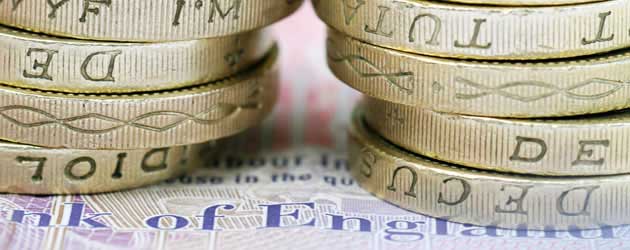
The Pound to Euro exchange rate (GBP/EUR) sunk to 1.1652 on Friday evening as markets reacted to Fitch’s decision to reduce the UK sovereign credit rating from AAA to AA+. The credit rating agency cited weak domestic growth and a growing debt mountain as reasons for the downgrade.
Hot on the heels of Moody’s, who cut the British sovereign rating to AA+ in February, Fitch opted to slash the UK credit rating because the country’s economic climate “is not consistent with an AAA rating”. British debt is now only rated as top-of-the-class by Standard & Poor’s, who re-affirmed the UK’s AAA credit rating earlier this month. Both Fitch and Moody’s have Britain on stable outlook, following their respective downgrades.
Fitch cut its economic growth projections for 2013 from 1.5% to 0.8%, and now predicts that General Government Gross Debt will peak at 101% of GDP in 2015-2016. The ratings agency previously stipulated that if British leaders failed to stabilise the debt burden below 100% of GDP then it would lead to a sovereign downgrade. In light of recent developments Fitch said:
“Despite the UK’s strong fiscal and financing flexibility underpinned by its own currency with reserve status and the long average maturity of public debt, the fiscal space to absorb further adverse economic and financial shocks is no longer consistent with an AAA rating”.
Whilst the Eurozone debt crisis was acknowledged as an important factor behind the prolonged weakness of UK growth, the fact that both private and public sector enterprises have been trying to bring down their balance sheets simultaneously was mentioned by Fitch as another reason for subdued domestic output.
The downgrade sent the Pound tumbling against all of its major currency peers. Sterling lost out on around half a cent against the Euro (GBP/EUR), -0.7 cents against the US Dollar (GBP/USD), -1.1 cents against the Canadian Dollar (GBP/CAD), -0.6 cents against the Australian Dollar (GBP/AUD), and -1.3 cents against the New Zealand Dollar (GBP/NZD).
Despite recent pressure from the IMF for Britain to change course and relax the pace of its austerity drive, Fitch’s decision did not appear to alter George Osborne’s view that tough fiscal consolidation is the way forward. The gentleman’s not for turning.
The Treasury said that the downgrade is “a stark reminder that the UK cannot simply run away from its problems, or refuse to deal with a legacy of debt built up over a decade”, whilst the Chancellor George Osborne argued that there is no alternative option for Britain: “I don’t feel under particular pressure politically because I don’t see anyone coming up with a credible alternative”.
The International Monetary Fund took the opportunity to turn the heat up Osborne and the Treasury, reiterating their stance from earlier in the week:
“We are saying with this medium-term strong anchoring of fiscal consolidation, the pace has to be adjusted depending on the circumstances and given the weak growth that we have observed lately…now might be the time to consider.”
The negative impact of the downgrade on Sterling’s exchange rate could be reversed on Wednesday if the British first quarter GDP figures show positive growth. However, if the UK slipped into negative territory during the first three months of 2013, signaling a symbolic triple-dip recession, then the Pound’s woes could accelerate swiftly.

Comments are closed.